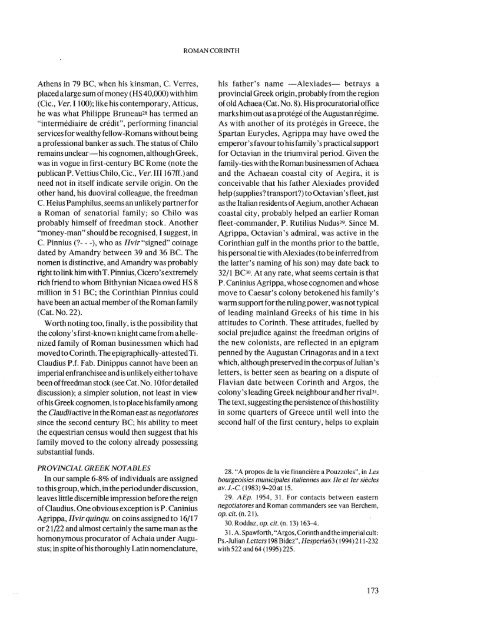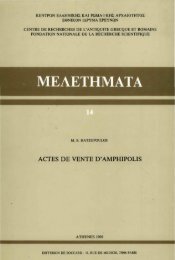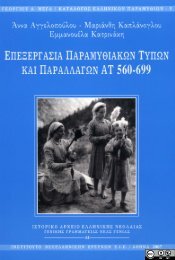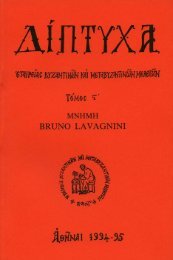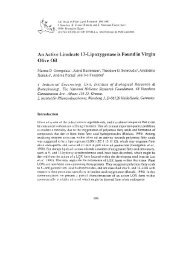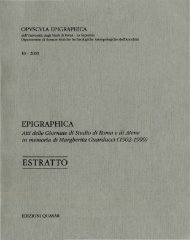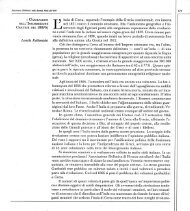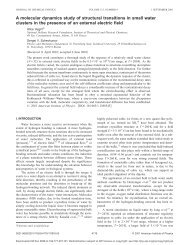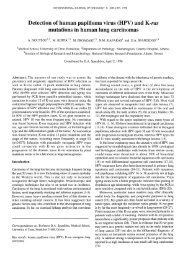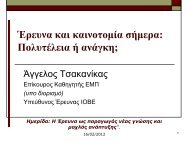Roman onomastics in the Greek East: social and political aspects ...
Roman onomastics in the Greek East: social and political aspects ...
Roman onomastics in the Greek East: social and political aspects ...
You also want an ePaper? Increase the reach of your titles
YUMPU automatically turns print PDFs into web optimized ePapers that Google loves.
ROMAN CORINTH<br />
A<strong>the</strong>ns <strong>in</strong> 79 BC, when his k<strong>in</strong>sman, C. Verres,<br />
placed a large sum of money (HS 40,000) with him<br />
(Cic, Ver. 1100); like his contemporary, Atticus,<br />
he was what Philippe Bruneau 28 has termed an<br />
"<strong>in</strong>termédiaire de crédit", perform<strong>in</strong>g f<strong>in</strong>ancial<br />
services for wealthy fellow-<strong>Roman</strong>s without be<strong>in</strong>g<br />
a professional banker as such. The status of Chilo<br />
rema<strong>in</strong>s unclear—his cognomen, although <strong>Greek</strong>,<br />
was <strong>in</strong> vogue <strong>in</strong> first-century BC Rome (note <strong>the</strong><br />
publican P. Vettius Chilo, Cic, Ver. Ill 167ff.) <strong>and</strong><br />
need not <strong>in</strong> itself <strong>in</strong>dicate servile orig<strong>in</strong>. On <strong>the</strong><br />
o<strong>the</strong>r h<strong>and</strong>, his duoviral colleague, <strong>the</strong> freedman<br />
C. Heius Pamphilus, seems an unlikely partner for<br />
a <strong>Roman</strong> of senatorial family; so Chilo was<br />
probably himself of freedman stock. Ano<strong>the</strong>r<br />
"money-man" should be recognised, I suggest, <strong>in</strong><br />
C. P<strong>in</strong>nius (?—), who as Hvir "signed" co<strong>in</strong>age<br />
dated by Am<strong>and</strong>ry between 39 <strong>and</strong> 36 BC. The<br />
nomen is dist<strong>in</strong>ctive, <strong>and</strong> Am<strong>and</strong>ry was probably<br />
right to l<strong>in</strong>k him with T. P<strong>in</strong>nius, Cicero's extremely<br />
rich friend to whom Bithynian Nicaea owed HS 8<br />
million <strong>in</strong> 51 BC; <strong>the</strong> Cor<strong>in</strong>thian P<strong>in</strong>nius could<br />
have been an actual member of <strong>the</strong> <strong>Roman</strong> family<br />
(Cat. No. 22).<br />
Worth not<strong>in</strong>g too, f<strong>in</strong>ally, is <strong>the</strong> possibility that<br />
<strong>the</strong> colony's first-known knight came from ahellenized<br />
family of <strong>Roman</strong> bus<strong>in</strong>essmen which had<br />
moved to Cor<strong>in</strong>th. The epigraphically-attestedTi.<br />
Claudius P.f. Fab. D<strong>in</strong>ippus cannot have been an<br />
imperial enfranchisee <strong>and</strong> is unlikely ei<strong>the</strong>r to have<br />
been of freedman stock (see Cat. No. lOfor detailed<br />
discussion); a simpler solution, not least <strong>in</strong> view<br />
of his <strong>Greek</strong> cognomen, is to place his family among<br />
<strong>the</strong> Claudiiactive <strong>in</strong> <strong>the</strong> <strong>Roman</strong> east as negotiatores<br />
s<strong>in</strong>ce <strong>the</strong> second century BC; his ability to meet<br />
<strong>the</strong> equestrian census would <strong>the</strong>n suggest that his<br />
family moved to <strong>the</strong> colony already possess<strong>in</strong>g<br />
substantial funds.<br />
PROVINCIAL GREEK NOTABLES<br />
In our sample 6-8% of <strong>in</strong>dividuals are assigned<br />
to this group, which, <strong>in</strong> <strong>the</strong> period under discussion,<br />
leaves little discernible impression before <strong>the</strong> reign<br />
of Claudius. One obvious exception is P. Can<strong>in</strong>ius<br />
Agrippa, Ilvirqu<strong>in</strong>qu. on co<strong>in</strong>s assigned to 16/17<br />
or 21/22 <strong>and</strong> almost certa<strong>in</strong>ly <strong>the</strong> same man as <strong>the</strong><br />
homonymous procurator of Achaia under Augustus;<br />
<strong>in</strong> spite of his thoroughly Lat<strong>in</strong> nomenclature,<br />
his fa<strong>the</strong>r's name —Alexiades— betrays a<br />
prov<strong>in</strong>cial <strong>Greek</strong> orig<strong>in</strong>, probably from <strong>the</strong> region<br />
ofoldAchaea(Cat.No.8).Hisprocuratorialoffice<br />
marks him out as aprotégé of <strong>the</strong> Augustan régime.<br />
As with ano<strong>the</strong>r of its protégés <strong>in</strong> Greece, <strong>the</strong><br />
Spartan Eurycles, Agrippa may have owed <strong>the</strong><br />
emperor's favour to his family's practical support<br />
for Octavian <strong>in</strong> <strong>the</strong> triumviral period. Given <strong>the</strong><br />
family-ties with <strong>the</strong> <strong>Roman</strong> bus<strong>in</strong>essmen of Achaea<br />
<strong>and</strong> <strong>the</strong> Achaean coastal city of Aegira, it is<br />
conceivable that his fa<strong>the</strong>r Alexiades provided<br />
help (supplies? transport?) to Octavian's fleet, just<br />
as <strong>the</strong> Italian residents of Aegium, ano<strong>the</strong>r Achaean<br />
coastal city, probably helped an earlier <strong>Roman</strong><br />
fleet-comm<strong>and</strong>er, P. Rutilius Nudus 29 . S<strong>in</strong>ce M.<br />
Agrippa, Octavian's admiral, was active <strong>in</strong> <strong>the</strong><br />
Cor<strong>in</strong>thian gulf <strong>in</strong> <strong>the</strong> months prior to <strong>the</strong> battle,<br />
his personal tie with Alexiades (to be <strong>in</strong>ferred from<br />
<strong>the</strong> latter's nam<strong>in</strong>g of his son) may date back to<br />
32/1 BC 30 . At any rate, what seems certa<strong>in</strong> is that<br />
P. Can<strong>in</strong>ius Agrippa, whose cognomen <strong>and</strong> whose<br />
move to Caesar's colony betokened his family's<br />
warm support for <strong>the</strong> rul<strong>in</strong>g power, was not typical<br />
of lead<strong>in</strong>g ma<strong>in</strong>l<strong>and</strong> <strong>Greek</strong>s of his time <strong>in</strong> his<br />
attitudes to Cor<strong>in</strong>th. These attitudes, fuelled by<br />
<strong>social</strong> prejudice aga<strong>in</strong>st <strong>the</strong> freedman orig<strong>in</strong>s of<br />
<strong>the</strong> new colonists, are reflected <strong>in</strong> an epigram<br />
penned by <strong>the</strong> Augustan Cr<strong>in</strong>agoras <strong>and</strong> <strong>in</strong> a text<br />
which, although preserved <strong>in</strong> <strong>the</strong> corpus of Julian's<br />
letters, is better seen as bear<strong>in</strong>g on a dispute of<br />
Flavian date between Cor<strong>in</strong>th <strong>and</strong> Argos, <strong>the</strong><br />
colony's lead<strong>in</strong>g <strong>Greek</strong> neighbour <strong>and</strong> her rival 31 .<br />
The text, suggest<strong>in</strong>g <strong>the</strong> persistence of this hostility<br />
<strong>in</strong> some quarters of Greece until well <strong>in</strong>to <strong>the</strong><br />
second half of <strong>the</strong> first century, helps to expla<strong>in</strong><br />
28. "A propos de la vie f<strong>in</strong>ancière a Pouzzoles", <strong>in</strong> Les<br />
bourgeoisies municipales italiennes aux Ile et 1er siècles<br />
av. J.-C. (1983) 9-20 at 15.<br />
29. AEp. 1954, 31. For contacts between eastern<br />
negotiatores <strong>and</strong> <strong>Roman</strong> comm<strong>and</strong>ers see van Berchem,<br />
op. cit. (n.21).<br />
30. Roddaz, op. cit. (n. 13) 163^1.<br />
31. A. Spawforth, "Argos, Cor<strong>in</strong>th <strong>and</strong> <strong>the</strong> imperial cult:<br />
Ps.-Julian Letters 198 Bidez", Hesperia 63 ( 1994) 211 -232<br />
with 522 <strong>and</strong> 64 (1995) 225.<br />
173


